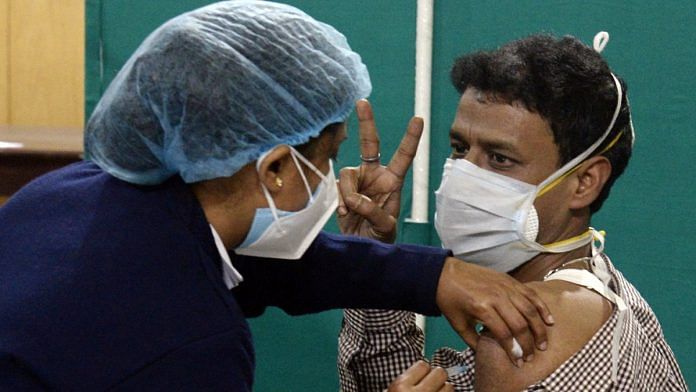New Delhi: Scientists from the Indian Council of Medical Research (ICMR) and the National Institute of Virology (NIV), one of its constituent institutes, have found that Covaxin can effectively fight the emerging variants of the SARS-CoV-2 virus, including Delta (B.1.617.2).
However, the ability of the antibodies to neutralise these variants is lower than that for B.1, one of the first identified variants of the novel coronavirus, the scientists have said in a study that is yet to be peer-reviewed.
The highly transmissible Delta variant is believed to be one of the factors that catalysed the devastating second Covid wave in India. Further mutations in Delta have led to the emergence of other variants — for example, AY.1, AY.2, and AY.3.
Of these, AY.1 was first detected in India in April 2021. There have been concerns whether the existing vaccines offer protection against the variants, but this has yet to be determined since their prevalence in the population is relatively low.
In the ICMR-NIV study, the researchers sought to determine the antibody levels and their neutralising potential by testing the blood samples of people who have either been vaccinated with Covaxin, received vaccination after recovery from Covid, or recovered from breakthrough infections (when infection occurs in fully-vaccinated individuals).
The antibody activity was measured in the lab against samples of the Delta, AY.1 and B.1.617.3 variants — and then compared to the activity recorded with B.1.
Among the 42 participants who were fully vaccinated with Covaxin, the neutralising activity was found to have reduced 1.3 times against the Delta variant, 1.5 times against AY.1, and 1.9 times against B.1.617.3, as compared to B.1.
Among the 14 participants who had recovered from Covid-19 and then received two doses of Covaxin, the neutralisation activity reduced by 2.5-fold against Delta, 3.5-fold against AY.1, and 3.8-fold against B.1.617.3.
In the 30 samples from breakthrough cases, there was a 1.9-fold reduction in neutralisation ability against the Delta variant, 2.8-fold reduction against the AY.1 variant, and 3.5-fold reduction against the B.1.617.3 variant.
The researchers noted that there was a minor reduction in the neutralising antibody levels in those who got their vaccines before or after Covid infection, compared to vaccinated individuals who didn’t get infected.
However, the team added that the blood samples from all the individuals indicate that antibody levels were high enough to effectively neutralise the Delta, AY.1 and B.1.617.3 variants.
The study did not involve clinical trials to test the efficacy of the vaccine against the emerging variants, and was based on lab tests.
Also Read: Delta variant of ‘great concern’, aggressive vaccine drive needed in India, ICMR journal says
How the study was conducted
For the study, the team conducted a plaque reduction neutralisation test, which is used to quantify the concentration of neutralising antibodies for a virus.
In this test, a blood serum sample is diluted and mixed with a viral suspension. The mixture is then left undisturbed to allow the antibody to react with the virus.
This is then poured over a layer of host cells — usually in a petri dish. The surface of the cell layer is covered with a layer of a jelly-like substance called agar to prevent the virus from spreading.
The researchers estimate the regions of infected cells — called plaques — formed after a few days. This can be done either using microscopic observation or specific dyes that react with infected cells.
The concentration of serum to reduce the number of plaques by 50 per cent gives the measure of how much antibody is present or how effective it is. This measurement is denoted as the PRNT50 value.
(Edited by Sunanda Ranjan)
Also Read: This is what makes India’s Delta variant of coronavirus so worrisome



